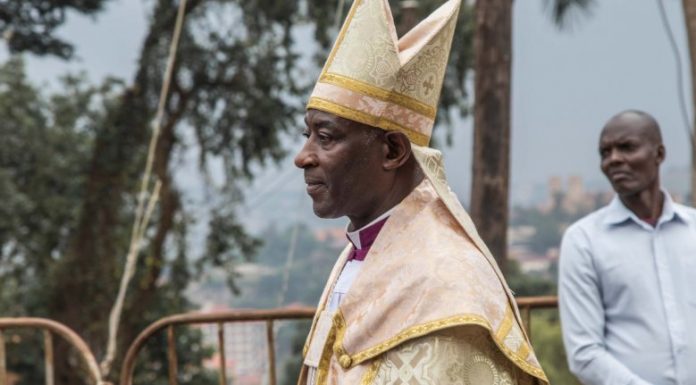In Uganda, unconditional cash transfers proved to be much more than emergency financial support.
As part of the ACT Alliance global response to COVID-19, the Church of Uganda received $100,000 USD in Rapid Response Funds from ACT which they have used to fund health education around COVID-19, community hygiene stations, and cash transfers for over 1000 vulnerable households around the country.
Broadcasting messaging about COVID-19 and GBV
Right from the beginning of the lockdown, the Church of Uganda used radio and television broadcasts to share science-based, factual information and health advice across the country, with Archbishop Dr. Stephen Kaziimba Mugalu warning people on a nationally broadcast church service in March 2020 that “COVID-19 kills. Stay safe!”
The information sharing from the Church of Uganda quickly expanded to include information and messaging about working to end gender-based violence, providing dioceses with megaphones to help them spread anti-GBV messages far and wide.
Cash transfers- a new experience for the Church of Uganda
As part of the Rapid Response Fund received from ACT Alliance, the Church of Uganda distributed money to 21 of the 37 dioceses in the country for cash transfer work. The regions chosen were those that had not been receiving food aid and other supports from the government, which tended to go to urban areas.
1065 families each received 100,000 shillings (about $28 USD) to spend with no conditions.
“For us, as Church of Uganda, this was not what we had anticipated,” said Josephine Ninsiima, the project coordinator. “We thought that people would buy food, but people decided to use the money according to the need they had at the point where the money was given. This has made the project impactful in many ways. When you look at the different places and communities, we have different stories of how people use the money. Some used it for household basic needs, others used it for treatment, others used it for farming. It is a whole lot of things, we found out.”
Sebastian Bamuliwa used the money to lease land for three gardens, and buy inputs to grow crops. “The harvest will feed my family,” he said, “and I shall raise an income from the remaining harvest.”
“Mum received 100,000 shillings and bought a piglet so that she can raise my school fees out of the project,” said one student. “We raised it, and it produced these three young ones.”
Some families received the money in cash, but others on their mobile phones. “We were extremely excited to see that 100,000 shillings were deposited on the mobile phones on the various people in my place,” said Ven. Rev. James Kivunike, Archdeacon Muterere, Busoga Diocese.
Benefits of cash transfer
The families who received the unconditional cash often make the money go much further than it would if they simply bought food. Their creativity and resourcefulness help the money to support the families for months into the future.
ACT Alliance has been supporting cash transfer as a method of meeting people’s needs in humanitarian responses for several years now. “By giving people the money they need, it allows them to make the purchases that will be most helpful to their family at that time,” said Elizabeth Kisiigha Zimba, ACT Alliance’s regional representative for Africa. “It also helps to support the community by allowing people to make purchases from local merchants, buying items that are appropriate and useful in their individual contexts. Therefore, a single cash transfer creates a wider impact that goes beyond the individual household recipient.”
Rt. Rev. George K Turyasingura, Bishop of East Rwenzori Diocese summed up the value of the project, “This programme came in at the right time, and the people were so grateful to receive voucher help… I would like to extend my sincere thanks to ACT Alliance, who came in at this time when we most needed it.”



